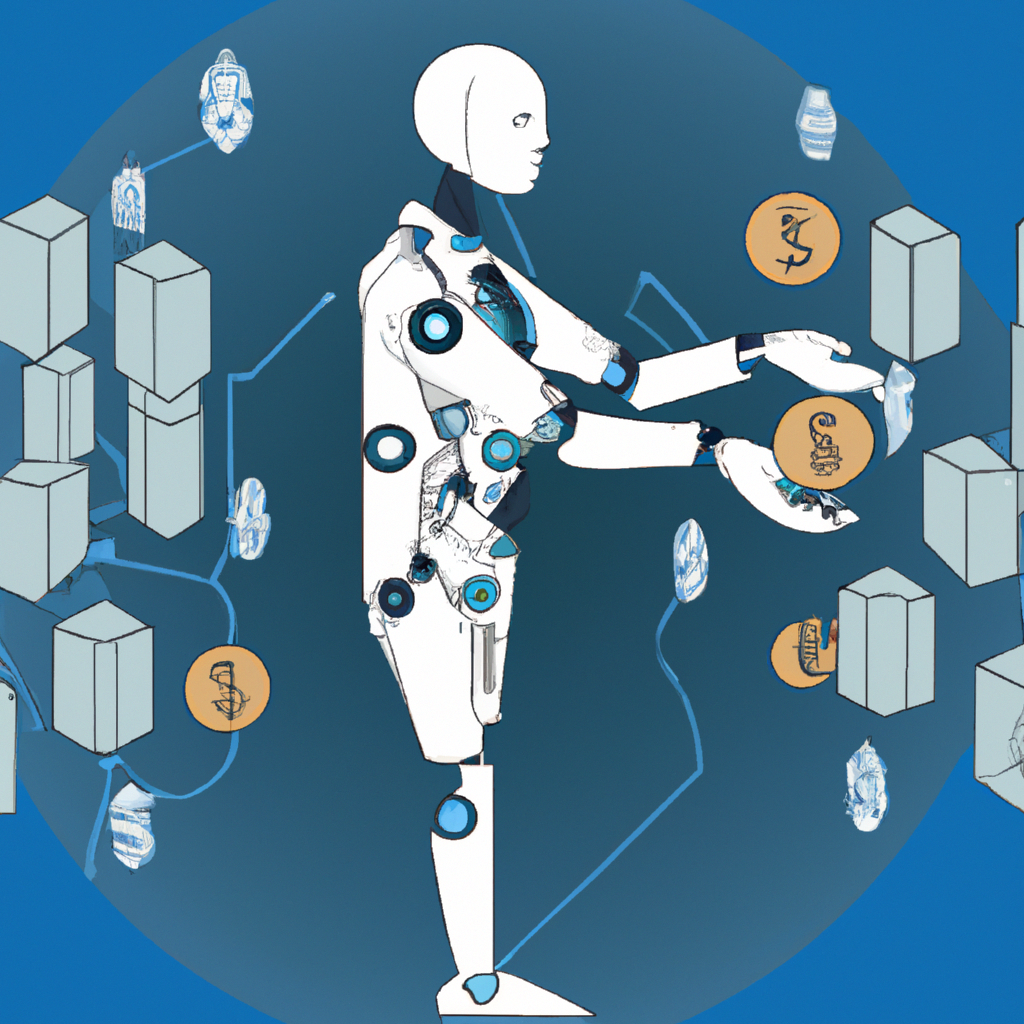-
Table of Contents
- Introduction
- Exploring the Impact of AI on Business Ethics: How Companies Can Ensure Responsible Use of AI
- The Role of AI in Corporate Social Responsibility: How Companies Can Use AI to Make a Positive Impact
- The Ethics of AI-Powered Automation: How Companies Can Ensure Fairness and Transparency
- The Challenges of AI-Driven Decision Making: How Companies Can Ensure Responsible Use of AI
- The Role of AI in Data Privacy: How Companies Can Ensure Compliance with Regulations and Protect User Data
- Conclusion
“AI Business: Maximizing Profit with Ethical Integrity.”
Introduction
The use of Artificial Intelligence (AI) in business is becoming increasingly prevalent, and with it comes a need to consider the ethical implications of its use. AI has the potential to revolutionize the way businesses operate, but it also carries with it a responsibility to ensure that its use is balanced with ethical considerations. This means that businesses must consider the potential risks and rewards of using AI, and ensure that they are taking steps to ensure that their use of AI is responsible and ethical. This includes considering the potential impact of AI on employees, customers, and the environment, as well as the potential for AI to be used for unethical purposes. By taking a proactive approach to AI ethics, businesses can ensure that they are maximizing the potential of AI while also minimizing the potential risks.
Exploring the Impact of AI on Business Ethics: How Companies Can Ensure Responsible Use of AI
As Artificial Intelligence (AI) continues to become more prevalent in the business world, it is important for companies to ensure that they are using AI responsibly. AI has the potential to revolutionize the way businesses operate, but it also has the potential to cause harm if used irresponsibly. To ensure that AI is used ethically, companies should take the following steps.
First, companies should ensure that their AI systems are transparent and accountable. This means that companies should be able to explain how their AI systems make decisions and be able to provide evidence that those decisions are fair and unbiased. Companies should also be able to demonstrate that their AI systems are not making decisions based on personal biases or prejudices.
Second, companies should ensure that their AI systems are secure. AI systems are vulnerable to cyberattacks, and companies should take steps to protect their systems from malicious actors. Companies should also ensure that their AI systems are not collecting or storing data that could be used to harm individuals or organizations.
Third, companies should ensure that their AI systems are designed to be ethical. This means that companies should design their AI systems to be compliant with applicable laws and regulations, and to respect the rights of individuals. Companies should also ensure that their AI systems are designed to be fair and equitable, and to treat all individuals equally.
Finally, companies should ensure that their AI systems are regularly monitored and evaluated. Companies should regularly review their AI systems to ensure that they are functioning as intended and that they are not causing any unintended harm. Companies should also ensure that their AI systems are regularly updated to reflect changes in the law or in the business environment.
By taking these steps, companies can ensure that they are using AI responsibly and ethically. AI has the potential to revolutionize the way businesses operate, but it is important for companies to ensure that they are using AI responsibly and ethically. By taking the steps outlined above, companies can ensure that their AI systems are transparent, secure, ethical, and regularly monitored and evaluated.
The Role of AI in Corporate Social Responsibility: How Companies Can Use AI to Make a Positive Impact
As technology continues to evolve, Artificial Intelligence (AI) is becoming increasingly important in the corporate world. AI can be used to automate processes, improve customer service, and even help companies become more socially responsible. In this article, we’ll explore how companies can use AI to make a positive impact on society and the environment.
AI can be used to help companies become more socially responsible in a number of ways. For example, AI can be used to analyze customer data and identify areas where a company can improve its social responsibility efforts. AI can also be used to automate processes that help reduce a company’s environmental impact, such as energy efficiency and waste management.
AI can also be used to help companies become more transparent and accountable. AI can be used to analyze customer feedback and identify areas where a company can improve its customer service. AI can also be used to monitor a company’s supply chain and ensure that it is meeting ethical standards.
Finally, AI can be used to help companies become more socially responsible by engaging with their customers. AI can be used to analyze customer data and identify areas where a company can improve its customer service. AI can also be used to create personalized experiences for customers, such as personalized product recommendations or tailored content.
In conclusion, AI can be a powerful tool for companies to become more socially responsible. AI can be used to analyze customer data, automate processes, and engage with customers in order to make a positive impact on society and the environment. By leveraging AI, companies can make a real difference in the world and create a better future for everyone.
The Ethics of AI-Powered Automation: How Companies Can Ensure Fairness and Transparency
As Artificial Intelligence (AI) and automation become increasingly prevalent in the workplace, companies must ensure that their use of these technologies is ethical and transparent. AI-powered automation can be a powerful tool for streamlining processes and improving efficiency, but it can also lead to unfair outcomes if not used responsibly. To ensure fairness and transparency, companies should take the following steps.
First, companies should ensure that their AI-powered automation systems are designed with fairness in mind. This means that the algorithms used to power the automation should be designed to treat all employees equally, regardless of their race, gender, or other characteristics. Companies should also ensure that their AI-powered automation systems are regularly tested and monitored to ensure that they are not introducing any bias into the workplace.
Second, companies should be transparent about how their AI-powered automation systems work. This means that employees should be informed about how the automation works and how it might affect their job. Companies should also provide employees with the opportunity to provide feedback on the automation system and how it is impacting their work.
Third, companies should ensure that their AI-powered automation systems are regularly reviewed and updated. As technology advances, companies should ensure that their automation systems are kept up to date and that any potential issues are addressed. This will help to ensure that the automation system is fair and transparent.
Finally, companies should ensure that their AI-powered automation systems are used responsibly. This means that the automation should not be used to replace human workers or to make decisions that could have a negative impact on employees. Companies should also ensure that their AI-powered automation systems are not used to discriminate against any employees.
By taking these steps, companies can ensure that their use of AI-powered automation is ethical and transparent. This will help to ensure that employees are treated fairly and that the automation system is used responsibly.
The Challenges of AI-Driven Decision Making: How Companies Can Ensure Responsible Use of AI
As Artificial Intelligence (AI) becomes increasingly prevalent in our lives, companies must ensure that they are using AI responsibly. AI-driven decision making can have a significant impact on people’s lives, and it is important to ensure that these decisions are fair and ethical. Here are some of the challenges companies face when using AI-driven decision making, and how they can ensure responsible use of AI.
One of the biggest challenges of AI-driven decision making is the potential for bias. AI algorithms are only as good as the data they are trained on, and if the data is biased, the decisions made by the AI will be too. Companies must be aware of the potential for bias in their data and take steps to mitigate it. This can include using data from a variety of sources, using data from different time periods, and using data from different demographics.
Another challenge is the potential for AI to be used to make decisions that are not in the best interest of the people affected by them. Companies must ensure that their AI algorithms are designed to make decisions that are fair and ethical. This can include using algorithms that are transparent and explainable, and that take into account the potential for unintended consequences.
Finally, companies must ensure that their AI algorithms are secure. AI algorithms are vulnerable to malicious attacks, and companies must take steps to protect their algorithms from being compromised. This can include using encryption, using secure data storage, and using secure authentication methods.
By taking these steps, companies can ensure that their AI-driven decision making is responsible and ethical. AI can be a powerful tool, but it is important to ensure that it is used responsibly. Companies must be aware of the potential for bias, the potential for decisions that are not in the best interest of those affected, and the potential for malicious attacks. By taking steps to mitigate these risks, companies can ensure that their AI-driven decision making is responsible and ethical.
The Role of AI in Data Privacy: How Companies Can Ensure Compliance with Regulations and Protect User Data
Data privacy is a major concern for companies in the digital age. With the rise of artificial intelligence (AI) and machine learning, companies must ensure that they are compliant with data privacy regulations and protect user data. AI can be used to help companies meet these goals, but it is important to understand how to use it properly.
AI can be used to help companies comply with data privacy regulations. AI can be used to detect and prevent data breaches, as well as to identify and address any potential privacy issues. AI can also be used to monitor user activity and detect any suspicious behavior. This can help companies ensure that they are compliant with data privacy regulations and protect user data.
AI can also be used to help companies protect user data. AI can be used to detect and prevent data breaches, as well as to identify and address any potential privacy issues. AI can also be used to monitor user activity and detect any suspicious behavior. This can help companies ensure that they are compliant with data privacy regulations and protect user data.
AI can also be used to help companies create better user experiences. AI can be used to analyze user data and provide personalized recommendations and services. This can help companies create better user experiences and ensure that users are getting the most out of their data.
Finally, AI can be used to help companies ensure that they are compliant with data privacy regulations. AI can be used to detect and prevent data breaches, as well as to identify and address any potential privacy issues. AI can also be used to monitor user activity and detect any suspicious behavior. This can help companies ensure that they are compliant with data privacy regulations and protect user data.
Overall, AI can be a powerful tool for companies to ensure that they are compliant with data privacy regulations and protect user data. Companies should use AI responsibly and ensure that they are using it in a way that is compliant with data privacy regulations and protects user data. By doing so, companies can ensure that they are providing a safe and secure environment for their users.
Conclusion
AI Business and Ethics is a complex and ever-evolving field that requires careful consideration and thoughtful decision-making. Companies must balance the need to make a profit with the responsibility to ensure that their AI systems are ethical and responsible. Companies must also ensure that their AI systems are transparent and accountable, and that they are not used to discriminate against any group of people. By taking these steps, companies can ensure that their AI systems are both profitable and ethical.




